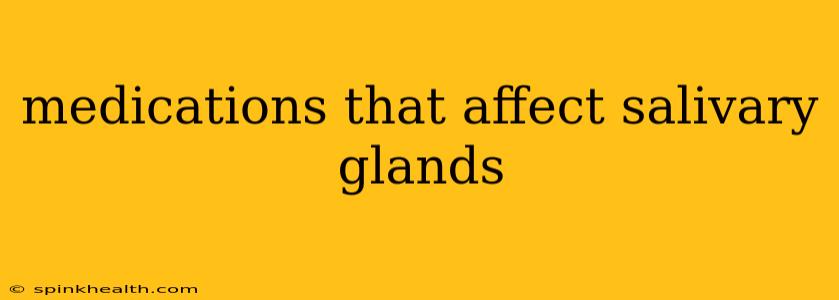Many of us take medications daily to manage various health conditions. While these medications are vital for our well-being, some can have an unexpected side effect: dry mouth, also known as xerostomia. This dryness isn't just an inconvenience; it can impact your oral health, making you more susceptible to cavities, gum disease, and oral infections. The culprit? The impact these medications have on your salivary glands. Let's delve into the fascinating world of salivary gland function and explore which medications are most likely to disrupt this crucial process.
Imagine your mouth as a delicate ecosystem. Saliva, produced by your salivary glands, is the lifeblood of this ecosystem. It's not just water; it's a complex fluid containing enzymes that begin the digestion process, proteins that protect your teeth from decay, and antibodies that fight off infection. When medication interferes with the production or flow of saliva, this delicate balance is thrown off.
What are the main functions of the salivary glands?
Your salivary glands are small, but mighty. They work tirelessly to produce saliva, playing a critical role in:
- Digestion: Saliva starts the breakdown of carbohydrates, making it easier for your body to absorb nutrients.
- Oral Health: Saliva neutralizes acids, washes away food particles, and strengthens tooth enamel, protecting against cavities.
- Speech and Swallowing: Saliva lubricates your mouth, making it easier to speak and swallow.
- Immune Defense: Saliva contains antibodies that combat bacteria and viruses, keeping your mouth healthy.
What medications are known to affect salivary glands and cause dry mouth?
Many different classes of medications can reduce saliva production. Here are some of the most common culprits:
1. Antihistamines: These medications, often used to treat allergies, can have a drying effect. Older, first-generation antihistamines like diphenhydramine (Benadryl) are particularly notorious for causing dry mouth. Newer, non-sedating antihistamines tend to cause less dryness, but it's still a possibility.
2. Decongestants: Similar to antihistamines, decongestants, especially those taken orally, can reduce saliva production. They often contain ingredients that constrict blood vessels, which can affect the salivary glands' ability to function optimally.
3. Diuretics: These medications, often prescribed for high blood pressure, increase urine production. This can lead to dehydration, which, in turn, reduces saliva production.
4. Antidepressants and Antipsychotics: Several antidepressants and antipsychotics, particularly older tricyclic antidepressants and some atypical antipsychotics, are known to cause dry mouth as a side effect.
5. Opioids: Pain relievers like codeine and morphine can significantly reduce saliva production, leading to uncomfortable dryness.
6. Muscle Relaxants: Certain muscle relaxants can have anticholinergic effects, reducing the stimulation of salivary glands.
7. Chemotherapy Medications: Some chemotherapy drugs used to treat cancer can have a damaging effect on the salivary glands, leading to severe dryness.
What are the long-term effects of dry mouth caused by medication?
Prolonged dry mouth isn't just uncomfortable; it can have significant consequences for your oral health. The reduced saliva flow increases your risk of:
- Dental Caries (Cavities): Without adequate saliva to neutralize acids and wash away food particles, your teeth become more susceptible to decay.
- Gingivitis and Periodontal Disease: Dryness can lead to inflammation and infection of the gums.
- Oral Thrush (Candidiasis): A fungal infection that can thrive in a dry mouth environment.
- Difficulty Eating and Speaking: Dryness can make it challenging to chew, swallow, and even speak clearly.
How can I manage dry mouth caused by medication?
If you're experiencing dry mouth due to medication, don't despair. There are several strategies you can employ to manage this side effect:
- Drink plenty of water throughout the day.
- Chew sugar-free gum or suck on sugar-free candies. This stimulates saliva production.
- Use artificial saliva substitutes. These are available over-the-counter at pharmacies.
- Avoid alcohol and caffeine, which can further dehydrate you.
- Practice good oral hygiene. Brush and floss regularly to remove food particles and plaque.
- Talk to your doctor or dentist. They may be able to adjust your medication or suggest other management strategies.
Can I switch medications to avoid dry mouth?
This is a crucial question, and the answer isn't always straightforward. Switching medications should always be discussed with your doctor. They can assess the risks and benefits of different medications and help you find an alternative that minimizes side effects while still effectively managing your health condition. Never stop or change your medication without consulting your healthcare provider.
Remember, this information is for general knowledge and shouldn't be considered medical advice. Always consult with your doctor or dentist before making any changes to your medication regimen or treatment plan. They can provide personalized recommendations based on your individual health needs and circumstances. Your oral health is an important part of your overall well-being, so don't hesitate to address any concerns with your healthcare team.

